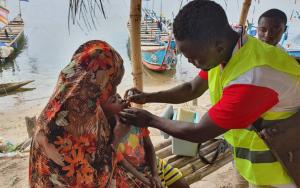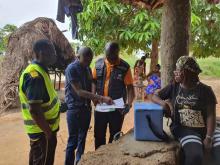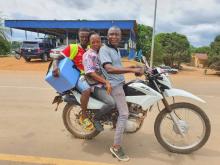Sierra Leone concludes First Round of a Nationwide Polio Vaccination
Freetown, Sierra Leone, 22nd May 2024 —The Sierra Leone Ministry of Health and National Public Health Agency with support of WHO and other partners including UNICEF, Rotary International, the US Centers for Disease Control and Prevention (CDC), Bill & Melinda Gates Foundation, and Gavi, the Vaccine Alliance have completed the first round of a nation-wide vaccination campaign to control the spread of vaccine-derived type 2 poliovirus (cVDPV2) in Sierra Leone.
About 1,669,594 children under five have been vaccinated across the country in this first round. Over 4,000 healthcare teams were mobilized during the campaign, including for community engagement and vaccine administration.
Confirmed in March 2024, the type 2 poliovirus (cVDPV2) outbreak was reported in the country and other neighboring countries of Guinea and Liberia, leading to synchronized house-to-house polio vaccination campaigns in the first round involving other five countries of Liberia, Guinea, Côte d'Ivoire, Mali, and Burkina Faso using the novel oral polio vaccine (nOPV2). The synchronization aimed at ensuring that every child under five years received the vaccine simultaneously, a critical step in combating polio. This round marks the first of two planned rounds with the second one expected to take place next month (June).
"Sierra Leone has made significant progress for mothers, which is why we are now directing our attention to children's health across different life stages, employing a person-centered approach. This vaccination affirms the government’s commitment to the people of Sierra Leone, striving to eradicate illnesses, especially among children,” said Professor Senessie, the Deputy Minister of Health.
“The country still has much to do to reduce the prevalence of illnesses amongst children and their adverse effects and we will work with our partners to push this agenda,” he added.
Mariatu Yambasu whose five-month-old baby was a beneficiary of the vaccine, urged mothers to overcome hesitancy and misinformation, emphasizing the profound benefits of vaccination in safeguarding children's health and well-being.
"I am here to vaccinate my child because I do not want her to contract the polio virus. As a mother, I will champion positive messaging on the benefits of vaccination,” said Mariatu.
Abu Bakarr Koroma, a polio survivor, also urged mothers to prioritize vaccination for their children. He emphasized the devastating consequences of polio and the importance of proactive measures. "I contracted the polio virus at age two; my parents took me to a quack doctor who administered the wrong treatment, leaving me paralyzed, said Koroma.” This devastates families, which I experienced firsthand, considering some misconceptions that polio is a curse,” he added.
The polio vaccination campaign is part of a larger response plan led by national health authorities to control the spread of polio. Parallel activities include strengthening surveillance and case detection, enhancing sample collection, procuring, and distributing vaccines in health facilities, and training and deploying vaccinators. Community engagement was also conducted to teach communities how to protect against polio.
Polio is an infectious disease caused by a virus that can spread from person to person and cause paralysis. It spreads through the consumption of oral fecal matter. Vaccination against polio is safe and effective for preventing the disease.
The WHO will continue to work with all partners to support the government of Sierra Leone through the Ministry of Health to strengthen health systems and support progress towards universal health coverage in the country.


